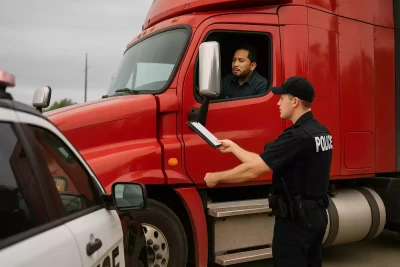Banned for Bad English? FMCSA’s Language Crackdown Sparks Debate
July 22, 2025
 The Federal Motor Carrier Safety Administration (FMCSA) is beginning active enforcement of long-standing English language proficiency requirements for commercial drivers, a move which has ignited fierce debate across the industry. While the regulation has existed since the 1930s, it is now being enforced with renewed intensity, highlighting the intersection of public safety, training standards, and the responsibilities of motor carriers.
The Federal Motor Carrier Safety Administration (FMCSA) is beginning active enforcement of long-standing English language proficiency requirements for commercial drivers, a move which has ignited fierce debate across the industry. While the regulation has existed since the 1930s, it is now being enforced with renewed intensity, highlighting the intersection of public safety, training standards, and the responsibilities of motor carriers.
At its core, the regulation is a safety measure. Being able to read road signs, communicate during emergencies, and understand verbal instructions are all essential for preventing accidents. Enforcement is now underway, and drivers found lacking the necessary language skills may be taken out of service on the spot, leaving carriers scrambling to recover both the driver and the load.
“It’s 100% a safety issue. It’s not in any way trying to be predatory to any particular group,” explains Jami Jones, Managing Editor of Land Line Magazine. “If somebody’s going down a mountain in Colorado and doesn’t understand what a runaway ramp sign is saying, that’s a safety issue.”
The FMCSA is placing clear responsibility on motor carriers to ensure drivers are qualified before they hit the road. This includes verifying that drivers can perform essential job functions in English, particularly during the mandatory skills test, which must be conducted entirely in English without translators. While written exams are still offered in multiple languages, the spotlight is now on how carriers prepare drivers before licensing and on-the-road deployment.
Will English language enforcement deliver on promises to increase highway safety? Hear what our guests had to say in the latest episode of the Stay In Your Lane Podcast.
Many immigrant communities within the trucking industry support this shift, recognizing that consistent enforcement protects both their livelihoods and the traveling public. Organizations like the Punjabi Trucking Association have voiced full support, acknowledging that clear communication on the road is fundamental to safety.
“There are a lot of immigrant communities in trucking who are absolutely behind this,” says RadioNemo host Jimmy Mac. “They understand the rules of the game. If you’ve got a five-second decision to make and you don’t recognize a sign, that’s a disaster waiting to happen.”
The move also underscores a broader policy agenda from the current administration, emphasizing public safety, secure borders, and an “America First” approach. Transportation Secretary Shawn Duffy has been a vocal advocate for reform, pushing for stronger regulatory compliance and accountability from carriers. Still, concerns remain about enforcement consistency and potential bias. Guidelines are being refined to prevent misuse and abused tied to English language enforcement. The goal is not to exclude, but to raise the standard in a fair and transparent way.
 “The guidelines here suggest a certain level of consistency,” says Mac. “We’ve got to make sure that we’re not talking about ‘I don’t like your accent, you’re out of service.’”
“The guidelines here suggest a certain level of consistency,” says Mac. “We’ve got to make sure that we’re not talking about ‘I don’t like your accent, you’re out of service.’”
In the end, most agree: strong walls and big doors. A secure, clearly defined system that welcomes those who follow the rules and ensures the safety of everyone on the road. The industry now waits to see if consistent enforcement will finally deliver on the promise of safer roads for carriers and the travelling public.
From shifting regulations to operational disruptions, Triple T Transport understands the complexities facing today’s supply chain. That’s why we partner with trusted carriers and work closely with clients to ensure compliance, safety, and efficiency at every turn. Whether you’re navigating new regulatory landscapes or looking for reliable 3PL solutions, our team is here to help you move forward with confidence.














